Ludza
Ludza (![]() pronunciation ; Polish: Lucyn, German: Ludsen, Russian: Лудза, Ludza) is a town in the Latgale region of eastern Latvia. It is located on the main Riga - Moscow road, part of European route E22, and only 30 km from the Latvian-Russian border. The population as of 2011 was 8,931.
pronunciation ; Polish: Lucyn, German: Ludsen, Russian: Лудза, Ludza) is a town in the Latgale region of eastern Latvia. It is located on the main Riga - Moscow road, part of European route E22, and only 30 km from the Latvian-Russian border. The population as of 2011 was 8,931.
Ludza | |
|---|---|
Town | |
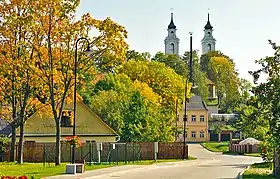 Ludza skyline | |
 Coat of arms | |
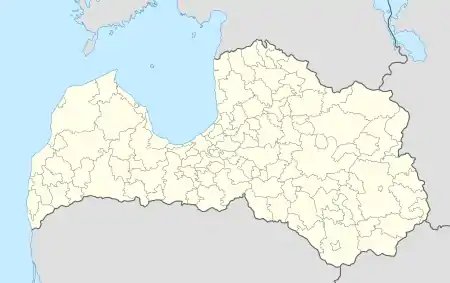 Ludza Location in Latvia | |
| Coordinates: 56°33′N 27°43′E | |
| Country | |
| Town rights | 1777 |
| Government | |
| • Mayor | Edgars Mekšs |
| Population (2011) | |
| • Total | 8,931 |
| Time zone | UTC+2 (EET) |
| • Summer (DST) | UTC+3 (EEST) |
| Postal code | LV-570(1-2) |
| Calling code | +371 657 |
| Number of Municipality council members | 15 |
| Website | ludza.lv |
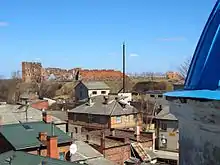
History
After Nikolay Karamzin, Ludza was first mentioned as Лючин in Hypatian Codex dating back to 1173 or 1177. In 1399 the Livonian Order built a stone fortress atop an older Latgalian fortress and used Ludza as an eastern outpost in Livonia. Ludza Castle ruins can be visited nowadays. After the dissolution of the Livonian Order in 1561, Ludza was incorporated to the Polish–Lithuanian Commonwealth and became part of Wenden Voivodeship. After the first partition of Poland in 1772 was taken over by the Russian Empire and added to Vitebsk Governorate. Ludza received town rights in 1777 from Catherine II of Russia. The Jewish population was important in the town. On July 1941, the Germans occupied the town and kept the Jews prisoners in a ghetto. From July 1941 until the spring of 1942, hundreds of Jews are murdered in mass executions perpetrated by Einsatzgruppen.
Until July 1, 2009, Ludza was the administrative centre of Ludza District. On July 1, 2009, due to the introduction of the new administrative division in Latvia it became the centre of Ludza municipality.
Tourism
Ludza Museum and Ludza Tourism Information Centre offer excursions around the town. The most visited sights are:
- Ludza History Museum and open-air exposition
- Roman Catholic Church
- Orthodox Church
- Evangelical Lutheran Church
- Old Believers' Church
- Ruins of the medieval Ludza Castle
- Ludza Craftsmen Centre
Several lakes offer fishing and water tourism possibilities.
Education
The children of Ludza may attend three pre-school educational institutions - "Rūķītis", "Pasaciņa" and "Namiņš". Elementary and secondary education curricula are provided by Ludza Gymnasium and Ludza Secondary School #2, as well as by Ludza Evening Secondary School. Additional out of school activities are offered at:
- Ludza Music Primary School (music school with integrated primary school)
- Ludza Art School
- Ludza Children and Youth Centre
- Ludza Sport School
Demographics
As of 2011, the town had a population of 8931, of which 5175 (57.9%) were ethnic Latvians, 3259 (36.5%) were ethnic Russians, 192 (2.1%) were Belarusians, 103 (1.2%) were Ukrainians, 84 (0.9%) were Poles, 23 (0.3%) were Lithuanians, and 95 (1.1%) belonging to other ethnic groups.[1]
Notable people
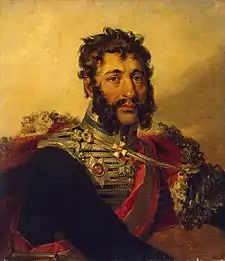
- Yakov Kulnev (1763–1812) – major-general, hero of the Patriotic war with Napoleon
- Ferdynand Antoni Ossendowski (1878—1945) – Polish writer and explorer
- Karol Bohdanowicz (1864–1947) – Polish geologist
- Wanda Dynowska (1888–1971) – Polish writer, translator and theosophist, social activist in India
- Leonid Dobychin (1894–1936) – Russian writer
- Ilya Chashnik (1902–1929) – Russian suprematist painter
Twinning and international cooperation
Ludza municipality has several cooperation partners abroad.
- Bad Bodenteich (Germany)
- Hlybokaye (Belarus)
- Brest (Belarus)
- Nevel (Russia)
- Sebezh (Russia)
- Novopolotsk (Belarus)
Ludza municipality takes part in the Euroregions Pskov, Livonija,[2] and Country of Lakes.[3]
Gallery
 Ruins of the castle
Ruins of the castle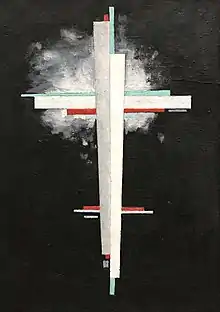 "Suprematism" by Ilya Chashnik, 1923
"Suprematism" by Ilya Chashnik, 1923 Ludza Catholic Church
Ludza Catholic Church%252C_Latgales_iela_121%252C_Ludza%252C_Latvia_-_M.Str%C4%AB%C4%B7is_-_Panoramio.jpg.webp) Russian Orthodox church in Ludza
Russian Orthodox church in Ludza Ludza Music Primary School
Ludza Music Primary School Lutheran Church
Lutheran Church Former synagogue
Former synagogue Jewish cemetery across Little Lake Ludza
Jewish cemetery across Little Lake Ludza
References
External links
| Wikimedia Commons has media related to Ludza. |
